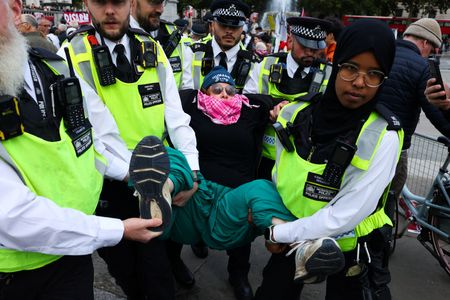LONDON (Reuters) -The British government on Friday lost its bid to block the co-founder of pro-Palestinian campaign group Palestine Action bringing a legal challenge over the banning of the group under anti-terrorism laws.
Huda Ammori, who helped found Palestine Action in 2020, was given permission to challenge the group's proscription on the grounds that the ban is a disproportionate interference with free speech rights, with her case due to be heard next month.
Britain's Home Office (interior ministry) then asked the Court of Appeal to overturn that decision and rule that any challenge to the ban should be heard by a specialist tribunal.
Judge Sue Carr rejected the Home Office's appeal, saying challenging the proscription in the High Court was quicker, particularly where people have been charged and are facing trial for expressing support for Palestine Action.
The court also ruled that Ammori could challenge the ban in the High Court on additional grounds, which Ammori said was a significant victory.
"It's time for the government to listen to the overwhelming and mounting backlash ... and lift this widely condemned, utterly Orwellian ban," she said in a statement.
The Home Office did not immediately comment.
DIRECT ACTION GROUP BANNED IN JULY
Palestine Action was proscribed as a terrorist organisation by the government in July, making it a crime to be a member, which carries a maximum sentence of 14 years in prison.
More than 2,000 people have since been arrested for holding signs in support of the group, with over 100 charged.
Before the ban, Palestine Action had increasingly targeted Israel-linked companies in Britain, often spraying red paint, blocking entrances or damaging equipment.
It accused Britain's government of complicity in what it said were Israeli war crimes in Gaza. Israel has repeatedly denied committing war crimes in its two-year military campaign, which began after Palestinian Hamas militants attacked Israel on October 7, 2023. Israel and Hamas agreed a ceasefire last week.
Palestine Action particularly focused on Israeli defence firm Elbit Systems, and Britain's government cited a raid by activists at an Elbit site last year when it decided to outlaw the group.
The group was banned a month after some of its members broke into the RAF Brize Norton air base and damaged two planes, for which four members have been charged.
Critics of the ban – including United Nations High Commissioner for Human Rights Volker Turk and civil liberties groups – argue that damaging property does not amount to terrorism.
However, Britain's former interior minister Yvette Cooper, who is now foreign minister, previously said violence and criminal damage have no place in legitimate protest.
(Reporting by Sam Tobin, editing by William James; editing by Mark Heinrich)







